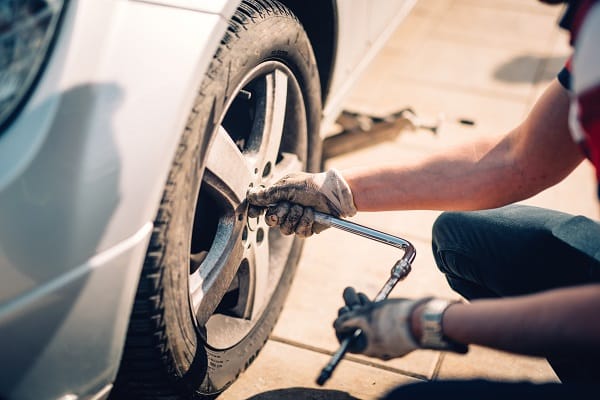For the majority of the year, storing your car is simple. All you have to do is ensure that your car is clean and dry. But when the winter sets in, storage can get a little more difficult. You must consider many things for storing your car during the coldest time of year. To help keep your vehicle looking its best as the cold weather passes, this article will provide you with a list of tips for storing your car in the winter!
Contents
The Damage Winter Weather Can Do To Your Car
Winter weather is something that needs to be taken into consideration when it comes to your vehicle. Cold temperatures can cause the fluids in your car to thicken and freeze, while snow can get into areas of your engine and cause a breakdown. Even rain and ice can corrode exposed parts of the engine and leave lasting damage. Along with that, winter weather can be particularly harsh on car batteries. Cold temperatures take a toll on the battery, causing it to lose its ability to hold a charge and potentially fail altogether.
As far as the actual appearance of the vehicle, winter weather can cause a lot of damage too. Salts used on icy roads and snow can make your car look dirty and dingy and even cause rust and corrosion to develop. And snow and ice on the windshield can leave spots that are difficult to clean off and cause cracks to form in the glass.
Tips for Storing Your Car in Winter
With all of these potential challenges, it is important to use a few tips for storing your car during the winter months! And while you may not have access to everything on this list, it is a good idea to try following as many of these tips as possible. Some key tips for storing your car during the winter months include:
Give It A Good Wash

One of the first things you should do when preparing your car for winter storage is to give it a good wash. This will remove any dirt, salt, and snow buildup that can cause damage to your vehicle. Be sure to clean both the outside and the inside of your vehicle, as dirt can get into crevices that are difficult to clean once the car is stored.
It is also a good time to wax your car, as this will help protect it from the elements and extend the life of your vehicle. If possible, try to use a wax that contains UV protection, as this will help prevent the paint from fading and cracking due to exposure to sunlight.
Fill The Tank

Winterizing your car is important in protecting it in the colder months. One essential step you should take when storing your vehicle away for winter is to fill the tank, which has several benefits! First, having a full gas tank helps keep moisture from entering and building up in the fuel lines and pump. Additionally, running the car for a few minutes every couple of weeks will make it easier to keep the battery functioning and prevent it from dying.
Filling your tank before storing is also smart on the wallet as regular check-ups become less frequent with a full gasoline tank. This will decrease the chances of sediment build-up, affecting performance when you start driving your car again come springtime.
Change The Oil And Filter

Although you may not be scheduled for an oil change, it is still a good idea to get it done if you want to store your car during the winter months. This will ensure that all of the dirt and debris are removed from your engine and help prevent any buildup from happening in your oil lines. Along with changing the oil, be sure to change the filter too.
Old, clogged filters can cause your engine to work harder and could lead to a breakdown when the temperatures are at their lowest.
In addition, make sure to use high-quality oil, as it will help protect engine components. Some experts also recommend using a thinner oil for the winter months because thicker oil can make it difficult for your car to start in cold temperatures and could even cause damage to the engine.
Do Some Tire Care

One of the most important things to do when storing a car for winter is to take care of your tires. Tires can be easily damaged in cold temperatures if proper precautions are not taken. Firstly, you should ensure that your tires are properly inflated before storage, so they don’t become flat and will last longer.
Secondly, you should move your car every month or so into another position where it is stored, as staying in the same spot for too long can cause flat-spotting.
Lastly, putting some protective cloth over the tires will protect them from cracks and other blemishes caused by prolonged exposure to things like sun, wind, and rain. Doing some simple tire care during winter storage will keep your car running better come springtime.
Cover Your Car

When it comes to storing a car during the winter, covering it up is one of the simplest ways to ensure its protection from the elements. A car cover not only helps keep your vehicle clean, but it can also help prevent any potential damage from the cold, snow, and ice. One of the best options for covering a car is an outdoor all-weather cover that has been specifically designed to be used in harsh winter climates.
The important thing is that you select a durable car cover that will help protect your vehicle from potential damage. And finally, make sure to secure the cover tightly, as this can help prevent any snow or ice buildup that may otherwise damage your car.
Find An Indoor Storage Area

When storing your vehicle for the winter season, finding an indoor location is key. It provides peace of mind from freezing temperatures and ice buildup and helps protect your car from other environmental factors like dirt, rust, heat, or moisture. A climate-controlled storage facility offers these benefits on a whole new level by controlling both temperature and humidity levels.
Furthermore, an indoor storage facility offers security benefits like video surveillance, gated access, and controlled entry. This will help ensure your vehicle is safe from any potential theft or damage during winter.
Take Precaution When Storing Your Care In The Winter!
Although it may seem as simple as just throwing a tarp over your car, taking proper precautions when storing your car for the winter is essential to ensuring that it is protected from potential damage. From filling the tank to covering your car and finding a climate-controlled storage facility, there are several things you can do to help keep your vehicle in great condition. So if you want to ensure that your car is ready for spring, be sure to take these steps when storing it for the cold winter months! And if you don’t have the garage space to store your car, consider looking into an indoor storage facility; they typically offer low monthly rates!


